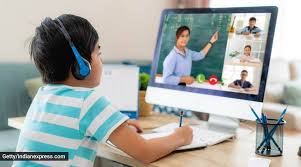COVID-19 causing extensive school closures, kids
across the nation are being given exchange resources, online, to study outside
of the classroom. Short-term solutions being devised for distant schooling from
online classroom tools like Google Classroom, to Zoom and podcasts by teachers.
Parents are adjusting to this new circumstance.
This
is a traumatic, erratic moment for one and all, as well as families, parents
and kids. You can help your kids by given the composition and schedule
and being a positive force in their education.


DIGITAL QUARANTINE
Kids are busy in digital
online classes. Since morning till afternoon they are occupied in online
classes. They get bored and does not have any enthusiasm for the online
classes. We should keep away our kids
from the phone, tablets etc. As we all are compel to provide education through
online.
MONITOR THE (COMPUTER) MONITOR
It's significant to verify
that your children are really learning. If you find that your child is not involved
with the lessons, don't be anxious to speak to the school teachers. Occasionally,
without difficulty remedied technical problems such as bad audio, poor connection
or an unhelpful camera angle can make all the difference.


Physical activity
Make sure your kids are involve in physical
activity and takes regular intervals during the online classes. Physical
activity is very important for them, engage them in indoor activities.
OLD SCHOOL
Parents should encourage kids
for book reading. If available, request textbooks from your child's school
along with other print materials in order to offset the amount of online
learning they will be doing. Studies show that remote education can be
challenging for all ages, but especially young kids, so do whatever you can and
always err on the side of caution. Stimulate self-expression by having
discussions with your children about what they are doing, and also encourage
creative writing and imaginative story telling.

Make stress- free plan for everyone
Good planning can relieve
stress for both children and parents. Check in with your kids about their plans
and help them develop a written schedule not only for the day, but for the week
as a whole. Help them prioritize and learn to create goals, tasks, and
deadlines, just like adults do when they go to work.
NO VACATION
Even though staying home from
school might feel like a holiday, remind your kids that they're not on
vacation. Assignments, grades, requirements, and tests like state exams, because
classes have moved online.
DON'T FORGET TO HAVE FUN
It's rare for parents and
children to have this much time together, so turn it into an opportunity for
bonding. Write predictions for a TV show that the whole family watches.
Organize a family card games, chess, get outside for a hike or walk together
after school. Follow your community's guidelines about safe behavior and
events, of course, but make sure you still find time for fun with your kids.
Without a doubt, this is a
challenging time for parents, teachers, and children alike. Studies show that
screen time can have both positive and adverse impacts on kids, and the shift
to online education will only increase your child's time with their devices.
Hopefully these common sense
practices can help you and your family navigate this new terrain and make the
most out of at-home learning.

 Create and manage your profile
Create and manage your profile Refer an author and get bonus Learn more
Refer an author and get bonus Learn more Publish any lost and found belongings
Publish any lost and found belongings Connect with the authors & add your review comments
Connect with the authors & add your review comments Join us for Free to advertise for your business or
Contact-us for more details
Join us for Free to advertise for your business or
Contact-us for more details
 Join us for Free to publish your own blogs, articles or tutorials and get your
Benefits
Join us for Free to publish your own blogs, articles or tutorials and get your
Benefits

 1 like
1 like


